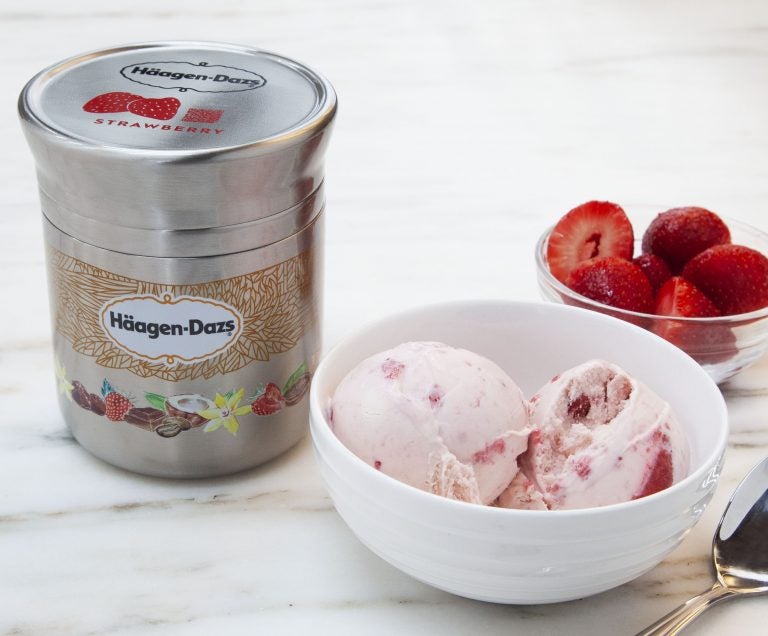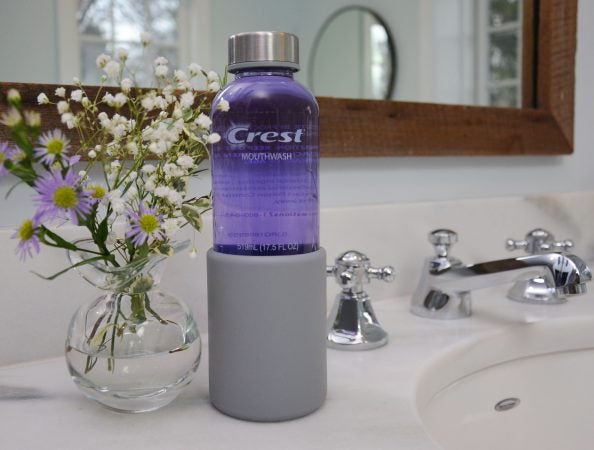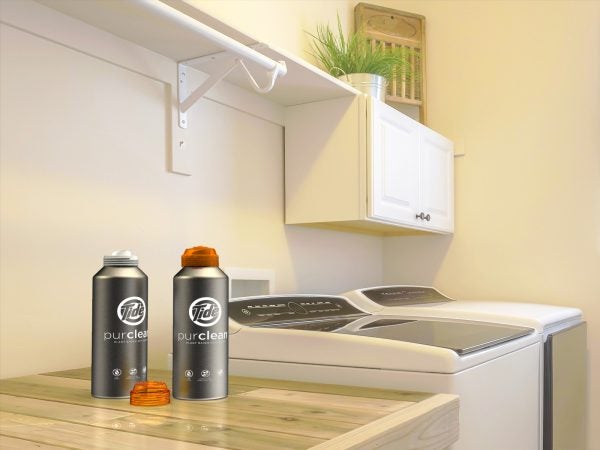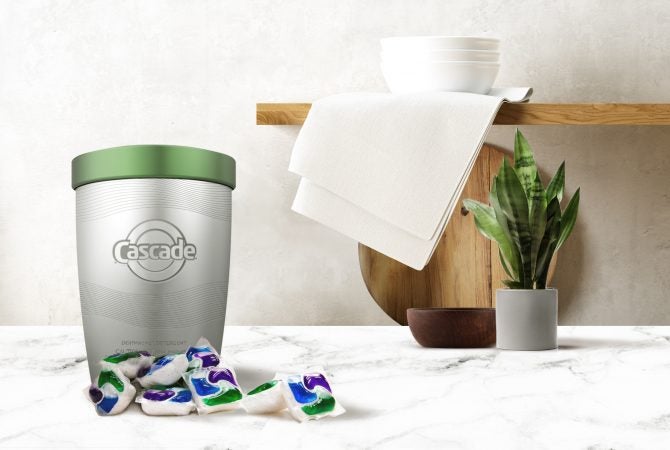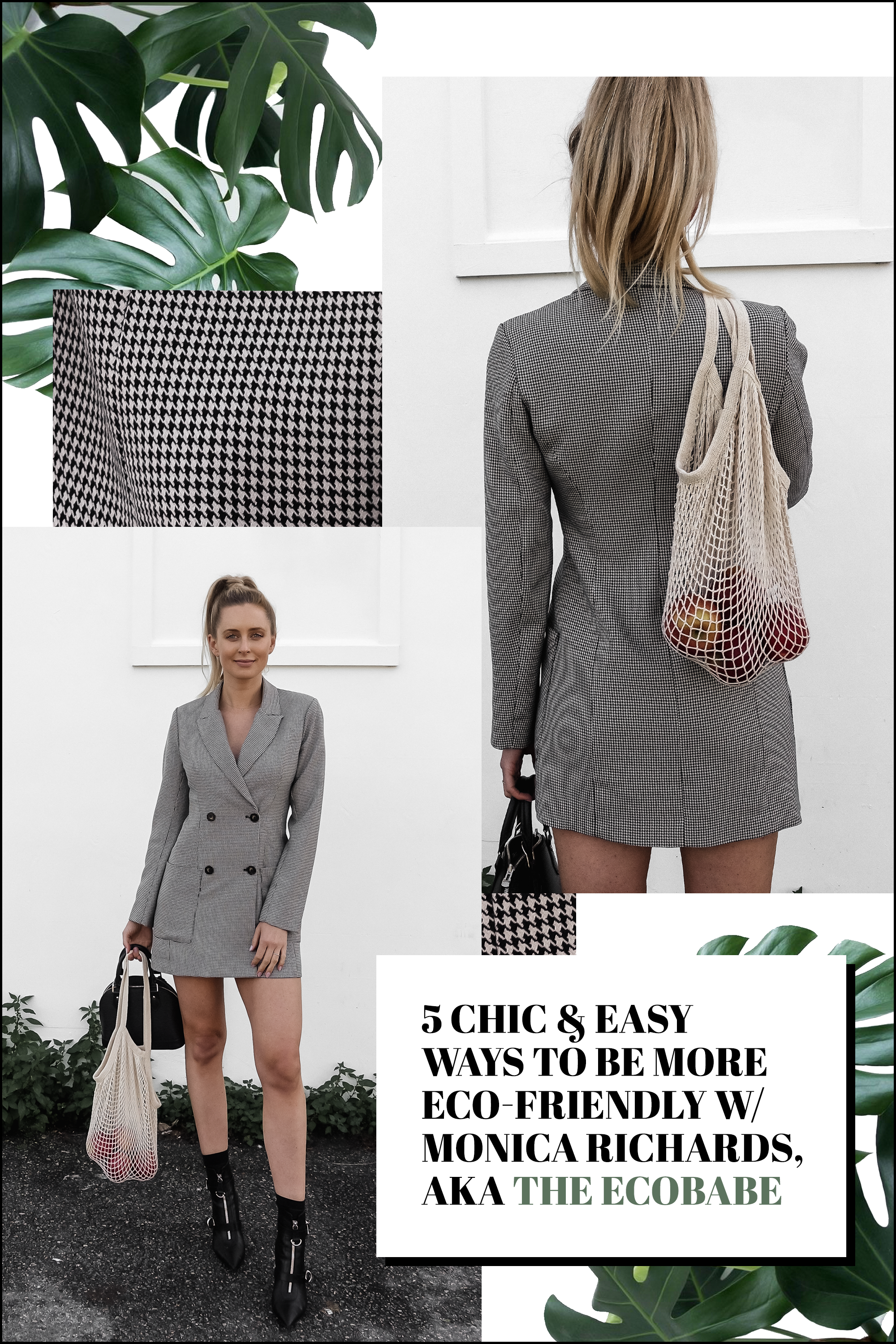
I have really been making it a goal of mine to be all around more conscious about our environment in the new year. I have always recycled, but I have been FAR from perfect & this year is my year of being ECO af. YOURS TOO, k?
I wrote a post about the
importance of swapping out your plastic straws a few weeks ago, but that was just scratching the surface of what WE can do to help protect our environment. I am NO expert in the subject, so in my quest to be more eco friendly/use my platform for GOOD, I am bringing in an ECO expert to the blog to really help us all learn more about what we can do.
SO- MEET MONICA RICHARDS, AKA
THE ECOBABE. I “met”
Monica on Instagram & have LOVED her eco content. She shares EASY, fun, & CHIC ways to be more eco friendly for EVERYONE. Plus, she is SO.EFFING.CUTE. I mean- can we just talk about her blazer look? Nothing more I love than a total stylish babe who does her part in making the world a better place.
ENOUGH ABOUT MY THOUGHTS THOUGH, I’LL LET MONICA TAKE IT FROM HERE…
Hi babes! I’m Monica Richards,
the ecobabe. I head up a community of women dedicated to changing the eco-stereotype one babe at a time. Being an
ecobabe means leading a non-toxic, affordable, eco-conscious life
in style. No Tevas allowed!
When Erica asked me to write a little something for her babes, I jumped at the opportunity! So today, we’re talking
the 5 easiest ways to go eco, without spending a ton of money. These are small steps each of you can take to make a big impact for us all — sea turtles included!!
SO- when it comes to going green, many people assume their individual contribution (or lack there of) won’t have much of an impact.. so why even bother?
BUT. You have to stop and think: if I’m decreasing my carbon footprint + I’m showing my circle how to decrease their carbon footprint + then THEY show their circle how to decrease THEIR carbon footprint…
Well then. Now we have an incredible chain reaction — an entire community of people making an environmental difference. And that community will keep growing + growing. And THAT’S how we make change happen.
This is the sort of climate change we NEED lol.
So now you’re saying, that’s great but what can I actually DO to decrease my carbon footprint?
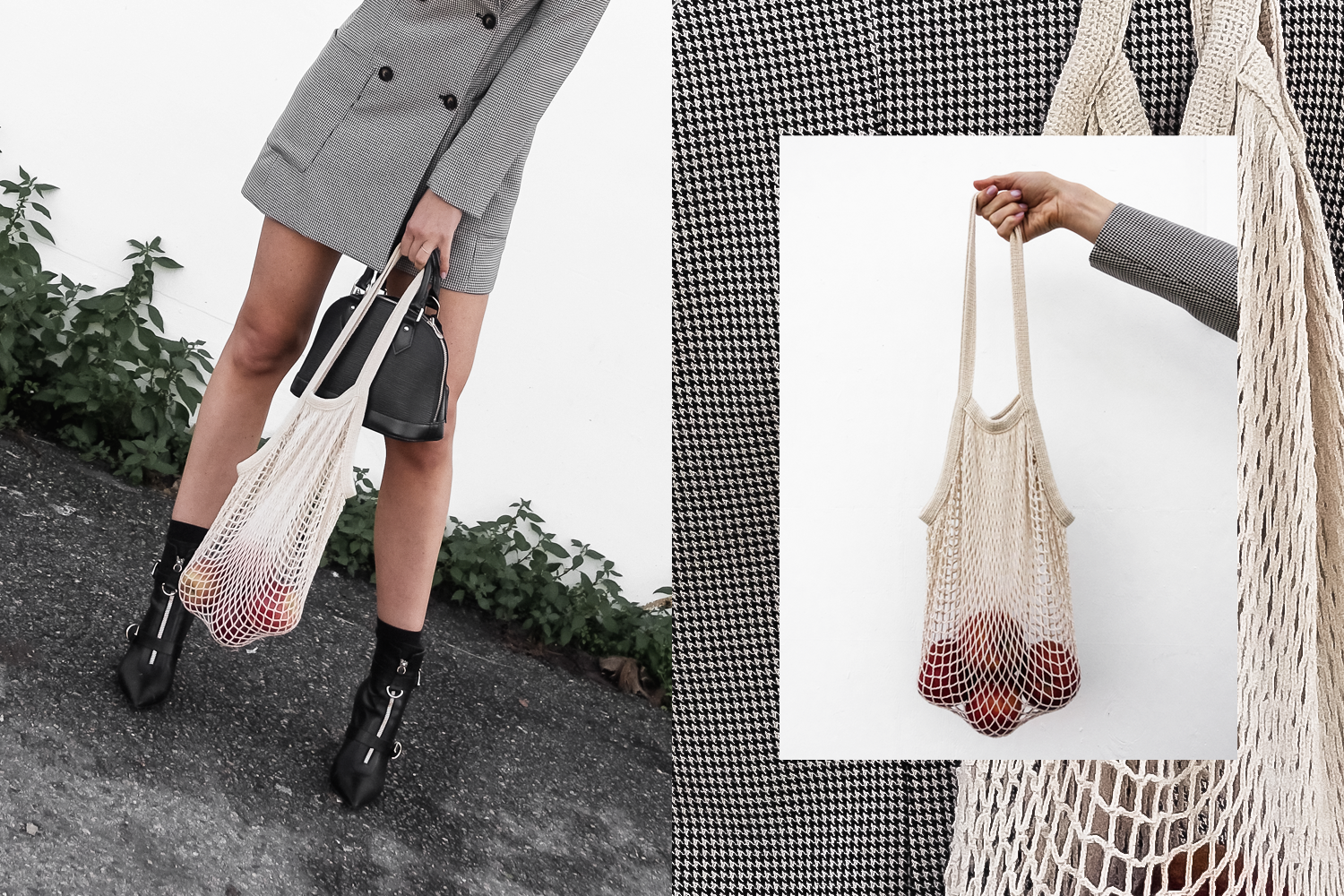
Let’s talk plastic for a minute. Plastic is one of the worst things for our environment, simply because we use plastic for EVERYTHING. Unfortunately, it takes tons of crude oil to produce + it takes 500 years to decompose. 500 YEARS. In the United States alone,
300 million TONS of plastic is produced, only 9% of which is recycled, leaving the rest to go straight to landfill. Then, when the plastics finally start to break down, they don’t even fully decompose. They break down into micro plastics, which run off with rain water into our streams + oceans. It is proven now that every living sea turtle has a tummy full of micro plastics. And that’s just the tip of the iceberg.
We’re ruining our environment to produce plastic, then we’re exposing ourselves to toxins from said plastic (I won’t even get into all the studies linking conditions like autism with plastic intake), then we’re disposing of this plastic + ruining our environment EVEN MORE. See where I’m going with this? It’s one big toxic circle — that we can’t recycle!!
Sounds daunting, huh? Like, how is it even possible to change this plastic problem just a little?!!
This is where I come in. I show my ecobabes how to go green, without spending a ton of money + without skipping a STEP in their daily routines. So here’s where we start:
5 EASY WAYS TO BE MORE ECO-FRIENDLY
1. REUSABLE BAGS:
Each year in America, more than 380 billion plastic bags are used. Remember,
91% of these bags are NOT recycled. And you know what’s easier than finding storage space in your kitchen for all those crappy plastic grocery bags? And cheaper, now that many grocery stores charge per paper bag?
Reusable bags!! Now, you can either upcycle bags you find around your house, like from those new shoes you just bought, or you can
buy new bags to use over + over. (I prefer ones you can wash + dry in the laundry.)
And here’s my 2 cents on ziplock bags: You don’t need them!
These reusable storage bags are BPA free (way healthier), they’re thicker + sturdier (way more functional) + you can reuse them to the moon + back (way easier on your wallet). And they’re cute!
2. REUSABLE CLOTHS
Just think about how many paper towels you go through on the daily… together, Americans go through
13 billion POUNDS of paper towels each year. And here’s what’s even sadder: if each household used just one roll less, more than 554,000 trees could be saved ANNUALLY. I just died inside, how about you?
But what are you supposed to use then — especially when cleaning your house?
Meet e-cloth! This cloth removes 99% of bacteria with just WATER. Yup. Imagine all the money you’ll save on cleaning products + those paper towels! There’s an e-cloth for everything: kitchen surfaces, bathroom surfaces, even your floors. And you can reuse these clothes all day every day. They are magical.
3. REUSABLE CUPS
This one seems like a given, but you’ll see that apparently it’s not: Just in the U.S. alone, we go through 50 billion plastic water bottles each year. Thats 100 MILLION bottles per DAY. And only 23% of those bottles are recycled. And since plastic takes 500 years to decompose, aren’t these numbers shocking??
Enter the reusable bottle! As soon as you start using this bad boy, you’ll be saving around 156 plastic bottles each year, all by yourself. Worth it!
This specific bottle is the best one I’ve found. It’s actually big enough to fit 1 liter of water (I hate having to refill my bottle a million times throughout the day). If you drink 2 of these bottles a day, you’re set. It can even have
a little BPA free straw! It’s also easy to wash because nothing irks me more than a water bottle with a small mouth that’s impossible to wash!
And for you coffee addicts (same),
this is the chicest little reusable coffee mug. Take this to any coffee shop + they’ll be happy to it swap out for you. You can even ask for discounts! Because here’s the alarming thing about to-go coffee cups:
YOU CAN’T RECYCLE MOST OF THEM. Most of those ‘paper’ cups are lined with 5% plastic. Which also means those plastic molecules are leaching into your cup of joe. Oh, + 16 billion disposable coffee cups are used around the globe each year. Don’t be a part of the coffee cup conundrum.
4. RECYCLE
At this point, we all know how vital recycling is for the health of our environment. Paper, plastics, aluminum + glass are pretty standard. For plastics, all you have to do is check with your local .gov website to see which number of plastic they take — meaning the resin identification code found on the bottom of all plastic containers.
But here’s what to do with all those hard-to-recycle items, like personal care packaging, electronics + textiles.
Use
Terracycle! This program recycles all those non-recyclables + is pretty much my most favorite thing ever. You can either purchase
a Terracycle box for the type of waste you generate most (they have a box for everything), or
sign up for the free recycling programs.
My favorite box to purchase is the
Kitchen Separation box. This is how you recycle things like protein bar wrappers, the plastic bags that line cracker boxes, tin foil, etc. The small box lasts a long time since you can smash all your recyclables down, making room for more layers. And you can use code
ECOBABE for 15% off any box!!
The free recycling programs are legit. Scroll through them here. They do take awhile to accept you, so while you’re on that waitlist, start collecting your recyclables. This way, by the time you’re accepted you’ll be ready to send them in! I’m in the personal care program (which even accepts mascara + lipstick tubes) + I’m obsessed with sending in my beauty empties.
5. REUSABLE STRAWS
Ever heard the saying ‘straws suck’? That’s because Americans use 500 MILLION plastic straws… EVERY. SINGLE. DAY. And since straws take up to 200 years to decompose in landfills, not to mention many of these straws end up in our oceans as little plastic daggers of death for marine life, single use straws are an epidemic.
Also, every time you sip on a standard disposable straw, you’re putting toxic plastic directly in your mouth(!!!).
The best way to combat all of this is to make that switch to reusable straws. And nowadays, it’s the trendy thing to do anyway YAY!
To make things even more adaptable, there’s also a straw for every type of babe: There’s
a metal straw for chic photos on the gram. These are super durable + I carry them in my purse + car. There’s
a silicone straw for that just-like-a-regular-straw feel. These are bendy + soft. And there’s
a glass straw for the most clean option, as you can see right through them. These don’t become hot in hot drinks.
The reusable straw options are cute + by using them, you’ll be sparing the environment 38,000 plastic straws just by YOURSELF. Win win.
 I have really been making it a goal of mine to be all around more conscious about our environment in the new year. I have always recycled, but I have been FAR from perfect & this year is my year of being ECO af. YOURS TOO, k?
I wrote a post about the importance of swapping out your plastic straws a few weeks ago, but that was just scratching the surface of what WE can do to help protect our environment. I am NO expert in the subject, so in my quest to be more eco friendly/use my platform for GOOD, I am bringing in an ECO expert to the blog to really help us all learn more about what we can do.
SO- MEET MONICA RICHARDS, AKA THE ECOBABE. I “met” Monica on Instagram & have LOVED her eco content. She shares EASY, fun, & CHIC ways to be more eco friendly for EVERYONE. Plus, she is SO.EFFING.CUTE. I mean- can we just talk about her blazer look? Nothing more I love than a total stylish babe who does her part in making the world a better place.
I have really been making it a goal of mine to be all around more conscious about our environment in the new year. I have always recycled, but I have been FAR from perfect & this year is my year of being ECO af. YOURS TOO, k?
I wrote a post about the importance of swapping out your plastic straws a few weeks ago, but that was just scratching the surface of what WE can do to help protect our environment. I am NO expert in the subject, so in my quest to be more eco friendly/use my platform for GOOD, I am bringing in an ECO expert to the blog to really help us all learn more about what we can do.
SO- MEET MONICA RICHARDS, AKA THE ECOBABE. I “met” Monica on Instagram & have LOVED her eco content. She shares EASY, fun, & CHIC ways to be more eco friendly for EVERYONE. Plus, she is SO.EFFING.CUTE. I mean- can we just talk about her blazer look? Nothing more I love than a total stylish babe who does her part in making the world a better place.
 Let’s talk plastic for a minute. Plastic is one of the worst things for our environment, simply because we use plastic for EVERYTHING. Unfortunately, it takes tons of crude oil to produce + it takes 500 years to decompose. 500 YEARS. In the United States alone, 300 million TONS of plastic is produced, only 9% of which is recycled, leaving the rest to go straight to landfill. Then, when the plastics finally start to break down, they don’t even fully decompose. They break down into micro plastics, which run off with rain water into our streams + oceans. It is proven now that every living sea turtle has a tummy full of micro plastics. And that’s just the tip of the iceberg.
We’re ruining our environment to produce plastic, then we’re exposing ourselves to toxins from said plastic (I won’t even get into all the studies linking conditions like autism with plastic intake), then we’re disposing of this plastic + ruining our environment EVEN MORE. See where I’m going with this? It’s one big toxic circle — that we can’t recycle!!
Sounds daunting, huh? Like, how is it even possible to change this plastic problem just a little?!!
This is where I come in. I show my ecobabes how to go green, without spending a ton of money + without skipping a STEP in their daily routines. So here’s where we start:
Let’s talk plastic for a minute. Plastic is one of the worst things for our environment, simply because we use plastic for EVERYTHING. Unfortunately, it takes tons of crude oil to produce + it takes 500 years to decompose. 500 YEARS. In the United States alone, 300 million TONS of plastic is produced, only 9% of which is recycled, leaving the rest to go straight to landfill. Then, when the plastics finally start to break down, they don’t even fully decompose. They break down into micro plastics, which run off with rain water into our streams + oceans. It is proven now that every living sea turtle has a tummy full of micro plastics. And that’s just the tip of the iceberg.
We’re ruining our environment to produce plastic, then we’re exposing ourselves to toxins from said plastic (I won’t even get into all the studies linking conditions like autism with plastic intake), then we’re disposing of this plastic + ruining our environment EVEN MORE. See where I’m going with this? It’s one big toxic circle — that we can’t recycle!!
Sounds daunting, huh? Like, how is it even possible to change this plastic problem just a little?!!
This is where I come in. I show my ecobabes how to go green, without spending a ton of money + without skipping a STEP in their daily routines. So here’s where we start:
